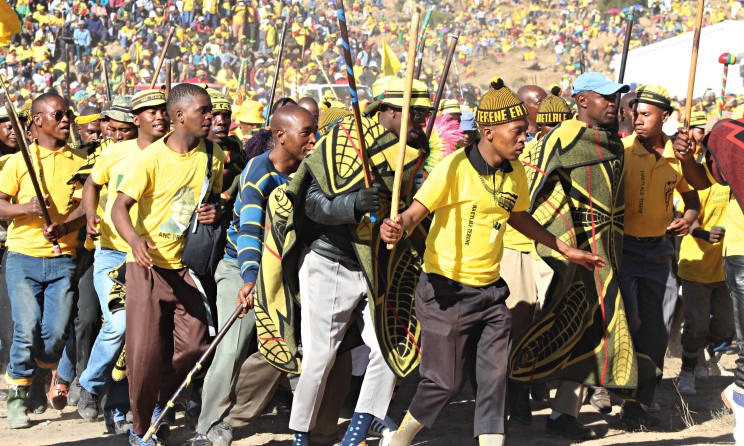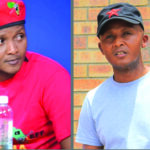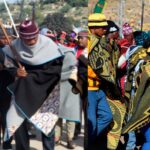Kananelo Boloetse
In the early 2000s, following the tragic killing of Sanko, tension within the Famo music community soared to unprecedented heights. The loss of such a prominent artist was a blow that could not simply be overlooked.
The following year, Famole, erroneously suspected of involvement in Sanko’s murder—allegations that have since been confirmed as highly misplaced—died in a car accident. These back-to-back deaths of major industry figures only served to exacerbate the already existing tensions.
Chakela, now left as one of the biggest artists in the district after the deaths of Sanko and Famole, seized the moment and established a Famo group called Terene.
Mafeteng residents, who traditionally wore yellow and black blankets, embraced Terene, which also adopted these colours, making it the district’s most recognised Famo group, surpassing other groups like in popularity.
I vividly recall an event near the Bantu ground, now upgraded and called Leshoboro Stadium, while I was at St John’s High School in Mafeteng. This event was reportedly aimed at fostering peace among different Famo groups following a spate of killings after Sanko’s murder.
Various artists attended, including Mantša, Lebohang Letšohla of Sefako sa Menoaneng, and Chakela, who arrived in a helicopter, donned in yellow robes typically worn by Bishops. Chakela was Sanko’s closest friend, while Mantša had collaborated with Famole.
The event was attended by the then police boss in Mafeteng, Senior Superintendent ’Mampho Mokhele and Tom Thabane, then a minister in the Lesotho Congress for Democracy (LCD)-led government.
Some critics argue that this event was not genuinely about peace but rather a strategic move to popularise Thabane, who was planning to break away from the LCD and form his own political party. They suggest that Thabane was exploiting divisions within the Famo community for his political gain.
Indeed, Thabane formed the All Basotho Convention (ABC) in October 2006, quickly gaining the endorsement of Famo heavyweights like Chakela, with Terene becoming a known ally of ABC. Mantša even ran for elections under the ABC banner.
My point is that Famo groups, despite their different blanket colours, supported ABC and campaigned vigorously for it ahead of the 2007 elections, which ABC lost to the ruling LCD. Many, including myself, were unhappy with Famo groups venturing into politics, given the highly polarising nature of Lesotho’s political landscape. It is worth noting that ABC had strong support among urbanites and the middle class, who did not criticise the politicisation of Famo, seeing it as an advantage to unseat the LCD.
Artists who stayed away from politics gained popularity around 2007, especially figures like Pheello and Lekase. Although they were known before, their brands grew significantly. Another artist who rose to prominence was Rantšo Maketsi from Thabana Morena.
These artists, avoiding the yellow and black blanket associated with ABC, wore Matlama blankets instead.
Staunch Famo fans, reasonably averse to political involvement, started wearing Matlama blankets and gravitated towards artists who stayed out of politics. Their music was a breath of fresh air. The type of songs, called Makhele, were already very popular among the people of Mafeteng, and these artists infused Makhele into their Famo music. This fusion was a perfect recipe that captivated Famo enthusiasts.
Rantšo, who founded the Seakhi group, was tragically murdered, allegedly due to jealousy from Terene, though this remains speculative.
Rantšo’s legacy lived on through young artists like his nephew, Lehlohonolo Maketsi, popularly known as Mahlanya. Seakhi quickly became a household name, not just in Mafeteng but across Lesotho, with their fans adopting the Matlama blanket and rallying behind the slogan “Ha se betsoe Seakhi.”
The murder of many Seakhi artists garnered public sympathy, with their lyrics often lamenting perceived systemic bias against them. However, these grievances were largely ignored by the urbanites, possibly to protect ABC’s reputation.
The police were largely perceived as being anti-LCD and pro-ABC. Allegations surfaced that some officers were staunch members of Terene, aiding in the elimination of Seakhi artists.
In one of his songs, Mahlanya stated: “Mapolesa ting a babolai, ke se ke itse le ba bolae batho ba Letlama, mohlomong ka mali a bona le tla thola borui,” implying that the police were complicit in the killings and suggesting that maybe with the blood of the Seakhi members would the police find prosperity.
However, these claims were not widely scrutinised because scrutinising them meant scrutinising ABC.
In Mafeteng, many viewed the killings as Terene’s jealousy of Seakhi’s rising stars. As Seakhi gained popularity, many fans began to abandon Terene.
Chakela, the leader of Terene, was allegedly involved in criminal activities aimed at toppling the government in 2007 after ABC lost the elections, and again in 2009 when the state house was attacked by foreign mercenaries. He was reportedly banned from entering Lesotho.
I vividly recall the killing of Famo artist Lephatšoe Lebajoa, better known as Selomo, in 2011. Mainstream commentators and ABC supporters blamed the LCD government for the ongoing Famo violence, viewing Selomo’s death as another stark example of the government’s failure to address the crisis.
Selomo was a member of Fito and a staunch supporter of ABC. The ongoing killings raised serious questions about the LCD-led government’s strategy in dealing with Famo violence.
The Lesotho Times reported: “The ongoing killings raise questions whether the government has any cogent strategy in dealing with the Famo violence.”
The publication further stated: “A few months ago we urged the government to act decisively to stop the senseless killings. Our call appears to have fallen on deaf ears. It is precisely for these reasons that we think the government and the ministers responsible for the arts and the police have blood on their hands.”
When Seakhi artists were killed, there was generally deafening silence in the media.
In 2012, LCD leader and Prime Minister Pakalitha Mosisili left LCD and formed the Democratic Congress (DC). Although DC won the most seats in the National Assembly, it was unable to form a government independently due to insufficient seats. Consequently, the ABC, LCD, and Basotho National Party (BNP) formed a coalition, with Thabane becoming Prime Minister, replacing Mosisili, and taking control of Defence, Police, and National Security.
Chakela and other exiled Basotho were allowed to return to Lesotho, heightening the concerns of Seakhi members about their safety under an ABC-led government.
Thabane’s coalition sought to reconcile the warring factions within the Famo community. Selibe Mochoboroane, an LCD National Executive Committee member and Deputy Minister in Thabane’s cabinet, was entrusted with bringing Seakhi to the negotiating table due to his ties to Malumeng in Thabana Morena, Seakhi’s stronghold.
Bereng Majoro, also known as Lekase, agreed to participate in the talks, and there were rumours of a joint concert symbolising peace between Terene and Seakhi.
However, the younger Seakhi artists were against these negotiations, feeling that Lekase did not represent them. Their stance was clear: they believed that ABC and Terene were synonymous, and thus, a government led by ABC was essentially a Terene-led government. They argued that seeking justice in such a scenario was akin to a hen expecting fairness from a court presided over by a hawk.
This is precisely why they stayed away. They perceived Thabane’s actions as another attempt to manipulate the divisions within the Famo community for his own political gain.
Consequently, the killings continued, with Terene seemingly having the upper hand. Many Seakhi artists expressed strong condemnation of Prime Minister Thabane, accusing him of trying to incapacitate them so that Terene could continue its violent actions unchecked.
Due to their reluctance to engage in the talks, Seakhi lost some members who believed it was crucial to set aside divisions and negotiate peace with Terene. This internal discord within Seakhi led to a spate of killings. Similarly, Terene faced its own internal factions, resulting in further violence.
Fast forward to today, where the government of Prime Minister Sam Matekane has declared Famo groups, including Terene and Seakhi, as unlawful due to their alleged subversive activities.
Many former ABC supporters, who remained silent when ABC infiltrated Famo music in 2006, are now members of Matekane’s party, the Revolution for Prosperity (RFP). These individuals are now loudly condemning these Famo groups as terrorist organisations and praising the government’s decision to ban them.
However, this does nothing to solve the underlying problem.
The current situation is a direct result of toxic politics, particularly those of the ABC. The very people who once championed ABC now seek to distance themselves from it, erase its influence, and throw everything associated with it under the bus.
Other groups, such as Seakhi, are becoming collateral damage as these erstwhile ABC members direct their fury at the party and its allies.
These former ABC members fail to acknowledge their complicity; for years, their votes helped ABC continue its infiltration of this genre. Now, they expect everyone to renounce Famo music just as they have renounced the ABC. This hypocrisy is as transparent as it is contemptible.
I do not hide my allegiance: I proudly support Seakhi.
I was drawn to this group as soon as it emerged because it was a breath of fresh air, bringing Famo back to the people after it had been hijacked by Terene and ABC.
As fans of Famo, we were left feeling abandoned, like children born out of wedlock when their mother remarries. Seakhi came and rescued the situation, restoring the music and culture we cherished.
Summary
- Chakela, now left as one of the biggest artists in the district after the deaths of Sanko and Famole, seized the moment and established a Famo group called Terene.
- I vividly recall an event near the Bantu ground, now upgraded and called Leshoboro Stadium, while I was at St John’s High School in Mafeteng.
- It is worth noting that ABC had strong support among urbanites and the middle class, who did not criticise the politicisation of Famo, seeing it as an advantage to unseat the LCD.

Your Trusted Source for News and Insights in Lesotho!
At Newsday Media, we are passionate about delivering accurate, timely, and engaging news and multimedia content to our diverse audience. Founded with the vision of revolutionizing the media landscape in Lesotho, we have grown into a leading hybrid media company that blends traditional journalism with innovative digital platforms.









